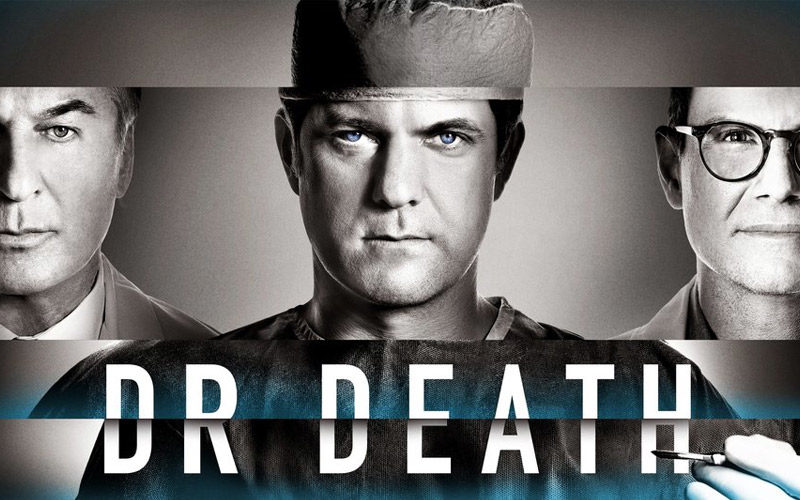Dr. Death Miniseries Review: Why Not How Crime Drama

Dr. Death, created by Patrick Macmanus, is a brilliant crime drama based on the true-crime podcast of the same name about the dangerous former neurosurgeon Christopher Dunstch.
Duntsch lost his Texas medical license after maiming several patient’s spines during surgeries and killing two of them. The real Doctor Death was sentenced to life imprisonment for injury to an older adult in 2017. One of Duntsch’s spinal surgeries paralyzed seventy-something-year-old Mary Efurd. Joshua Jackson brings the charming psychopathic surgeon Christopher Dunstch to life.
Jackson’s portrayal of Duntsch as a charmer is enhanced by the actor’s natural likability, which helps the audience understand why patients trusted the surgeon and overlooked obvious red flags. In the miniseries premiere ” Diplos,” Duntsch smiles at the E.S.L. teacher Rose Keller and her husband as they drive up to his practice in Dallas, Texas. Dunstch appears to be a caring doctor. Jackson brings easy-going humor to Duntsch. Duntsch lightens up the room, which is why his patients trust him to perform complicated procedures.
Dr. Death effectively uses the technique of repeating scenes from different characters’ points of view to reveal Duntsch’s mindset before and during surgeries. Within each episode, we delve into different periods of his life. Sometimes there are scenes of Duntsch in medical school. Then a cut to a scene of fellow surgeons Dr. Randall Kirby (Christian Slater) and Dr. Robert Henderson (Alec Baldwin) acting like detectives trying to figure out how this incompetent surgeon even earned a medical license. But, of course, the audience knows about Duntsch’s criminal charges from the start, so the story is about learning why this happened rather than solving a murder mystery.
A prime example of these “repeating scenes” is in the first episode when O.R. circulating nurse Josh Baker (Hubert Point-Du Jour) preps Rose for her surgery at Dallas Medical Center. Duntsch strolls into the hospital room. He acts charming toward Rose but ignores Josh. The O.R. nurse notices a hole in the back of Duntsch’s scrubs, revealing he is not wearing underwear. When the nurse informs Duntsch of the rip, the surgeon kicks him out of the room. Both Duntsch’s unkempt appearance and aggressive behavior toward the nurse predict the reckless controlling neurosurgeon he turns out to be. Dunstch reveals his shallow affect by how he effortlessly switches from grinning to snarling.
Later in Episode Seven, “Feet of Clay,” the “ripped scrubs” scene is shown from Doctor Death’s point of view. Duntsch has just been kicked out of Baylor but received surgical privileges from the less prestigious Dallas Medical Center. Baylor learned that he is a drug addict and makes rookie mistakes during surgery, causing irreparable harm to patients.
In “Fleet of Clay’, Duntsch blankly marches through the hall of Dallas Medical Center to upbeat rock instrumentals. As he walks through the hall, we hear lines of dialogue from the premiere episode. The juxtaposition makes us realize how oblivious Duntsch is to the outside world. Duntsch unkept appearance suggests that he has been partying all night. He enters Rose’s room as she says she is leaving herself in ” God’s and Dr. Dunstch’s hands.” Dunstch’s whole face brightens. The surgeon has been transformed himself into a different person.
Duntsch is performing as the well-rested brilliant, “considerate doctor.” The scene goes back and forth with medium shots of Duntsch and Rose in her hospital bed. These focused medium shots show the surgeon’s whole focus is on Rose because she is his “cash cow. ” Surgeries equal money and status to him. Josh comes behind Duntsch to tell him about the hole in his scrubs. Josh is out of focus in the frame. The nurse is just a pest in the surgeon’s way to glory. After being rudely excused, Josh leaves the frame. Then there is a medium close-up of Duntsch’s face as he promises Rose she will be doing cartwheels after the surgery. There is a crazy glint in his eyes. Duntsch has no concern for patients like Rose’s well-being, only that they fund his party lifestyle.
Vascular surgeon Dr. Randall Kirby’s arrogant nature helps the viewer differentiate between psychopathy and a surgeon’s self-important mentality. During the criminal trial, prosecutor Michelle Shughart (AnnaSophia Robb) asks Dr. Kirby to introduce himself to the jury. Dr. Kirby won’t stop talking about his achievements, starting with his undergraduate degree. After mentioning his fellowships at Baylor, Michelle can’t get a word in as he lists his credits. Everybody in the courtroom looks frustrated after he speaks about himself for five straight minutes straight. Kirby is presented as the archetypical pompous surgeon.
While operating room politics stopped Dr. Kirby from rescuing Joe Padua from a horrific surgery in the miniseries, he’s the one who pushed for an investigation into Duntsch. He researched Duntsch’s background after the neurosurgeon almost killed his “pool guy” (Padua). Kirby talked calm, collected neurosurgeon Dr. Henderson into helping him looking into all of Duntsch’s surgeries to see how they could stop him from practicing medicine.
There would have been no criminal trial without Kirby and Henderson harassing the Dallas DA office into charging Duntsch with a severe criminal offense. Even after the Texas Medical Board stripped Duntsch of his surgical license, the psychopathic surgeon would have kept operating on people’s spines somewhere else in the world if he wasn’t stopped. Dr. Kirby may be an overdramatic surgeon, but he honestly cares about his patient’s well-being.
I wouldn’t recommend Dr. Death to anybody about to go into surgery, but the miniseries is a must-watch for true-crime fans!


I had heard about this show from a friend of mine and now I HAVE to watch it after your great review.
Thank you! I think you would really love Dr. Death. Let me know what you think.